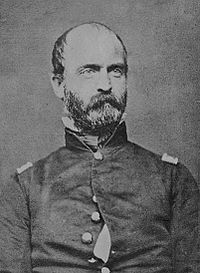Lewis A. Armistead
| Lewis A. Armistead | |
|---|---|
 |
|
| Nickname(s) | Lo (short for Lothario) |
| Born |
February 18, 1817 New Bern, North Carolina |
| Died | July 5, 1863 (aged 46) Gettysburg, Pennsylvania |
| Buried at | Old Saint Paul's Cemetery Baltimore, Maryland |
| Allegiance |
|
| Service/branch |
|
| Years of service | 1839–61 (USA) 1861–63 (CSA) |
| Rank |
|
| Unit | 6th U.S. Infantry |
| Commands held |
57th Virginia Infantry Armistead's Bde, Pickett's Div, I Corps |
| Battles/wars | |
Lewis Addison Armistead (February 18, 1817 – July 5, 1863) was a career United States Army officer who became a brigadier general in the Confederate States Army during the American Civil War. On July 3, 1863, as part of Pickett's Charge during the Battle of Gettysburg, Armistead led his brigade to the farthest point reached by Confederate forces during the charge, a point now referred to as the high-water mark of the Confederacy. However, he and his men were overwhelmed, and he was wounded and captured by Union troops; he died in a field hospital two days later.
Armistead, known to friends as "Lo" (for Lothario), was born in the home of his great-grandfather, John Wright Stanly, in New Bern, North Carolina, to Walker Keith Armistead and Elizabeth Stanly. He came from an esteemed military family. Armistead was of entirely English descent, and all of his ancestry had been in Virginia since the early 1600s. The first of his ancestors to emigrate to North America was William Armistead from Yorkshire, England. Armistead's father was one of five brothers who fought in the War of 1812; another was Major George Armistead, the commander of Fort McHenry during the battle that inspired Francis Scott Key to write "The Star-Spangled Banner", which would later become the national anthem of the United States. On his mother's side, his grandfather John Stanly was a U.S. Congressman, and his uncle Edward Stanly served as military governor of eastern North Carolina during the Civil War.
...
Wikipedia
